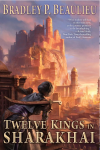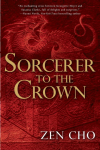RA Alert: Diverse Fantasy on NPR
NPR,org is on something of a Fantasy spree, devoting stories to Terry Pratchett’s last novel and, in what seems like a direct response to both the Hugos and the We Need Diverse Books campaign, offering two reviews that highlight the diversity of the genre, its authors, and its characters.
 One is Bradley P. Beaulieu’s newest novel, Twelve Kings in Sharakhai (Penguin/DAW; Brilliance Audio), a Silk Road Fantasy, set not in the fantasy genre’s familiar quasi-medieval world of Western Europe but in locales inspired by and situated within Eastern cultures. For Beaulieu that means Islamic and Ancient Egyptian influences fill this first of a new series.
One is Bradley P. Beaulieu’s newest novel, Twelve Kings in Sharakhai (Penguin/DAW; Brilliance Audio), a Silk Road Fantasy, set not in the fantasy genre’s familiar quasi-medieval world of Western Europe but in locales inspired by and situated within Eastern cultures. For Beaulieu that means Islamic and Ancient Egyptian influences fill this first of a new series.
NPR.org’s reviewer Jason Heller sings the novel’s praises noting its “intricate, suspenseful” plot, the female “gladiator by trade” central character who is “fierce…dynamic, multilayered, utterly fascinating,” and a setting created out of a “fabulist mix of cultures.”
In recommending readers dive in he offers this ready-made RA annotation:
Fantasy and horror, catacombs and sarcophagi, resurrections and revelations: The book has them all, and Beaulieu wraps it up in a package that’s as graceful and contemplative as it is action-packed and pulse-pounding. As fantasy continues to diversify and open itself up to a more vibrant representation of cultures and possibilities, Twelve Kings in Sharakhai should rank among the most satisfying.
 The second of NPR’s most recent picks is Zen Cho’s debut novel Sorcerer to the Crown (Penguin/Ace; OverDrive Sample).
The second of NPR’s most recent picks is Zen Cho’s debut novel Sorcerer to the Crown (Penguin/Ace; OverDrive Sample).
Reviewer Amal El-Mohtar says it nods towards Susanna Clarke’s Jonathan Strange and Mr. Norrell in its settings and blend of real world and magic, but that it “actively exploits gaps and shortcomings in” Clarke’s modern classic.
In a packed and multifaceted review, El-Mohtar neatly explains the many-threaded plot:
When Sir Stephen Wythe, England’s Sorcerer Royal, dies in mysterious circumstances, his adopted black son Zacharias takes up the Sorcerer’s staff amid malicious mutterings that he murdered his guardian for the position. The timing is terrible: Besides being in disgrace with Fairyland, England is enmeshed in non-magical war with France and in tense diplomatic talks with the Sultan of Janda Baik over the matter of witches and snake-women. Zacharias must contend with an overreaching government, assassination attempts, the decline of magic — and, most unexpectedly, with Prunella Gentleman, a dark-skinned young Englishwoman of uncertain parentage who wishes to escape her magical school and enter society.
And then heaps praise on Cho for her approach and execution:
Cho foregrounds characters that are usually treated as curiosities and set pieces in Regency fiction giving them complex inner lives and thoroughly enriching her world-building as a result… Cho’s achieved something remarkable in making corrupt bureaucracy more terrifying than dragons; ambitious baronets more dangerous than vampires. I was genuinely chilled by the depiction of powerful men’s whims where magic and the Sorcerer Royal’s position were concerned: Dragons can be fought and beaten, but white supremacy and institutional oppression are as atmospheric as the magic in Cho’s world.
Lest she leave readers thinking that Cho’s novel is a slog, El-Mohtar is also quick to point out
Absolutely everything about this book is delightful. I can’t remember the last time I read a fantasy novel that made me laugh so much — and as often as I laughed, I gasped, I shouted rude words at offending characters, and just generally fell over myself with admiration for Cho’s dextrous depiction of Regency manners and wit.
